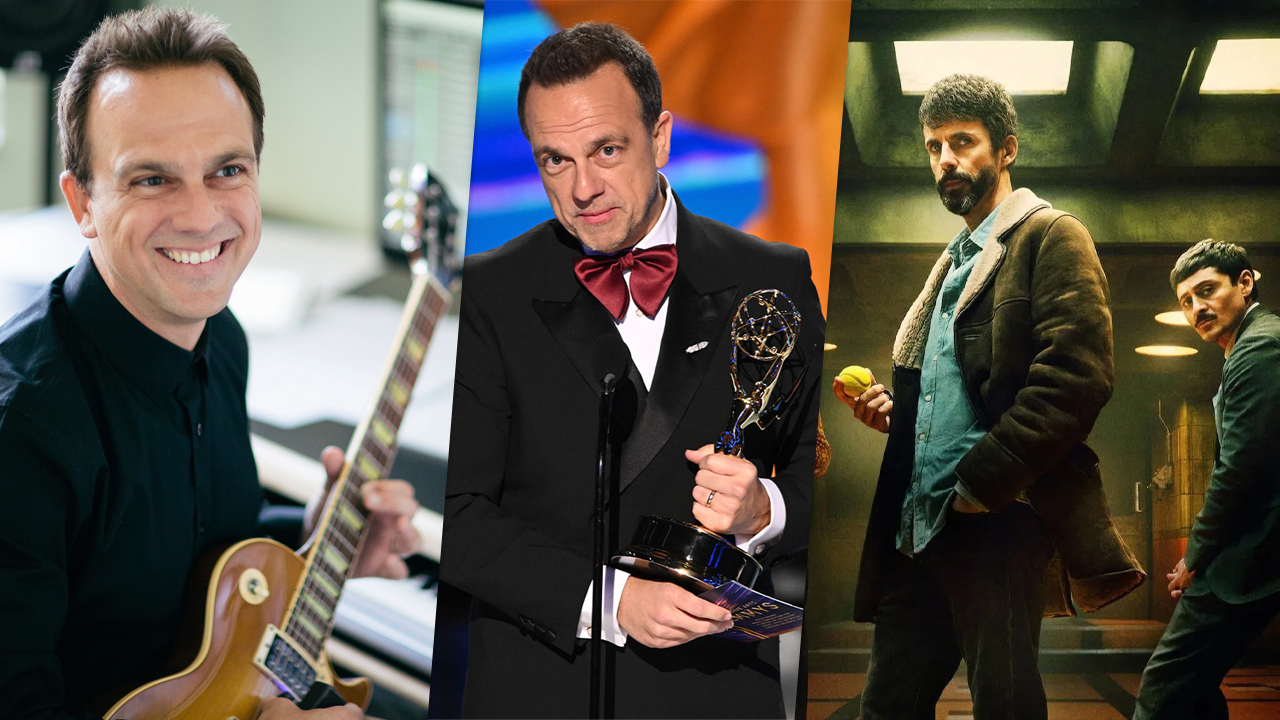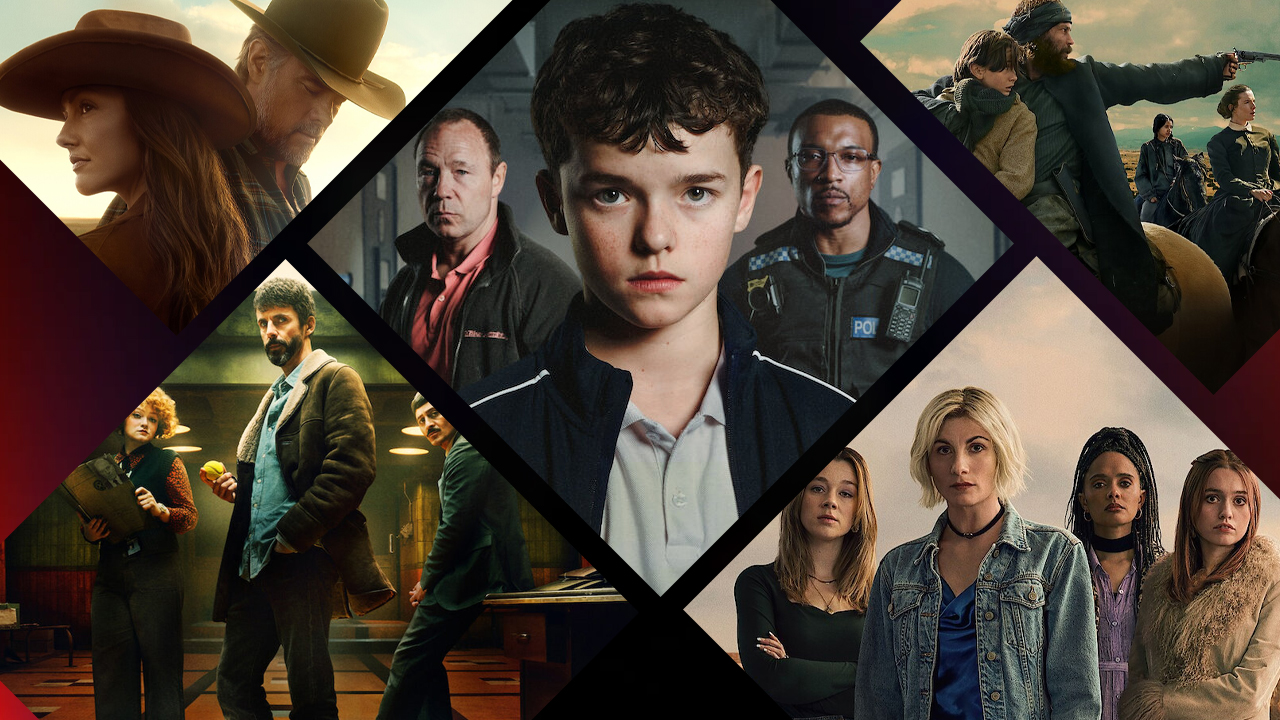Picture: Carlos Rafael Rivera
We recently had the pleasure of discussing the score of Netflix’s hit crime drama, Dept Q, with two-time Emmy award-winning composer Carlos Rafael Rivera.
Dept Q. is a crime drama series created by Scott Frank, who also co-directed the series alongside Elisa Amoruso.
Matthew Goode stars as Carl Morck, a talented but broken detective who has just returned to work after recovering from being shot, which led to the death of another officer and the paralysing of his best friend. He is assigned to lead a brand-new department that specializes in cold cases.
Before working on Dept. Q, Carlos Rafael Rivera worked on the mini-western drama Godless, the viral drama The Queen’s Gambit, the Mexican family film Chupa, and the crime drama Griselda.
Jacob: How did you first get involved with Dept Q?
Carlos: Scott [Frank] sent me an email detailing the next project he’s working on, and I was like “oh, my gosh, that’s so exciting!” Scott has a lot of strength, and the noir stuff and the dark subject matters being dealt with at a human level– and what I mean by human level is kind of like the joy, and the levity he finds in the stories is something that I find very attractive.
He ends up doing a lot of things where the subject matter is so dark, but then you’ll have these one-liners that the characters will say that are funny, and you find yourself laughing in a very dark situation. I think only people like Scott can pull that off, you know, because it truly is a human experience. We’re not all somber, and we’re not all dark, and we’re not all matted, or all joyful and all happy. No, it’s like from one moment to the next, you go from total crap, crying to massive laughter to — or not!– or just boring or whatever it is. Scott seems to encapsulate the human experience in a way that I find truly awe-inspiring, because he is truly great at that, and so getting to work with him was a great opportunity.
Jacob: I would argue as well that it’s very much British humour, taking something dark and then making a joke out of it.
Carlos: Yes! And that’s the thing, I think he nailed that part. That’s what made reading the screenplay so good, because he’s excellent. He’s one of the great screenwriters.
Jacob: How would you describe your score for Dept. Q?
Carlos: Well, I know Scott wanted a muscular score. That’s a key word, I think, that he kept saying. Like it was, I would love a muscular score and an aggressive score. And he sent me a playlist of bands like the Dropkick Murphys and other bands that were very, you know, had that Scottish or Celtic rock bands.
So the main title was born out of that idea. The main title has been kind of an invitation to the party, that is its job. So, the first thing I wrote was the main title for this one, and based it on the music Scott sent me. In the end, I came up with an idea of a melodic descending line that reflected Carl Morck, and our main character’s free fall. This is a man in free fall, and his life is an utter disaster. Still, when we encounter him, his life is getting progressively worse, I would say. It’s a very one-to-one idea that things are not working out.
So the music descends, and I came up with this descending line, and then Scott Frank had written these chords, as he used to be my guitar student. He had these chords that I put the melodic line against, but then I added some aggressive elements by incorporating rock elements. It’s funny, because I sent it to him, and he said he really liked it, and I go “Oh you do? Are you sure?” and then he goes ” No, no, I really do!” and then I go, “Well you kind of wrote it because these are your chords!” That surprised him, but that’s what became the score, then the rest of the score came once I started seeing the picture, and the darkness of the story. The story is based on the Scandinavian genre by Jussi Adler-Olsen. But again, as mentioned earlier, Scott finds levity in the darkness.
I think adapting it to Scotland in that way felt very appropriate, in the sense that moving it from a whole dark thing to darkness with those moments of human interaction, and human emotionality, or connection. To score that, it felt like it needed to address both of his requests and also the characters. Always character first, like Carl’s aggression is presented in the soundtrack, and named after him, of course. So that kick’s in when we see Carl’s new office, and when he goes down into the office, and we hear the music with an acoustic guitar bass, but there’s also a choir, and it’s emotional because we’re seeing Carl at his most vulnerable, and that music pays off in the end.
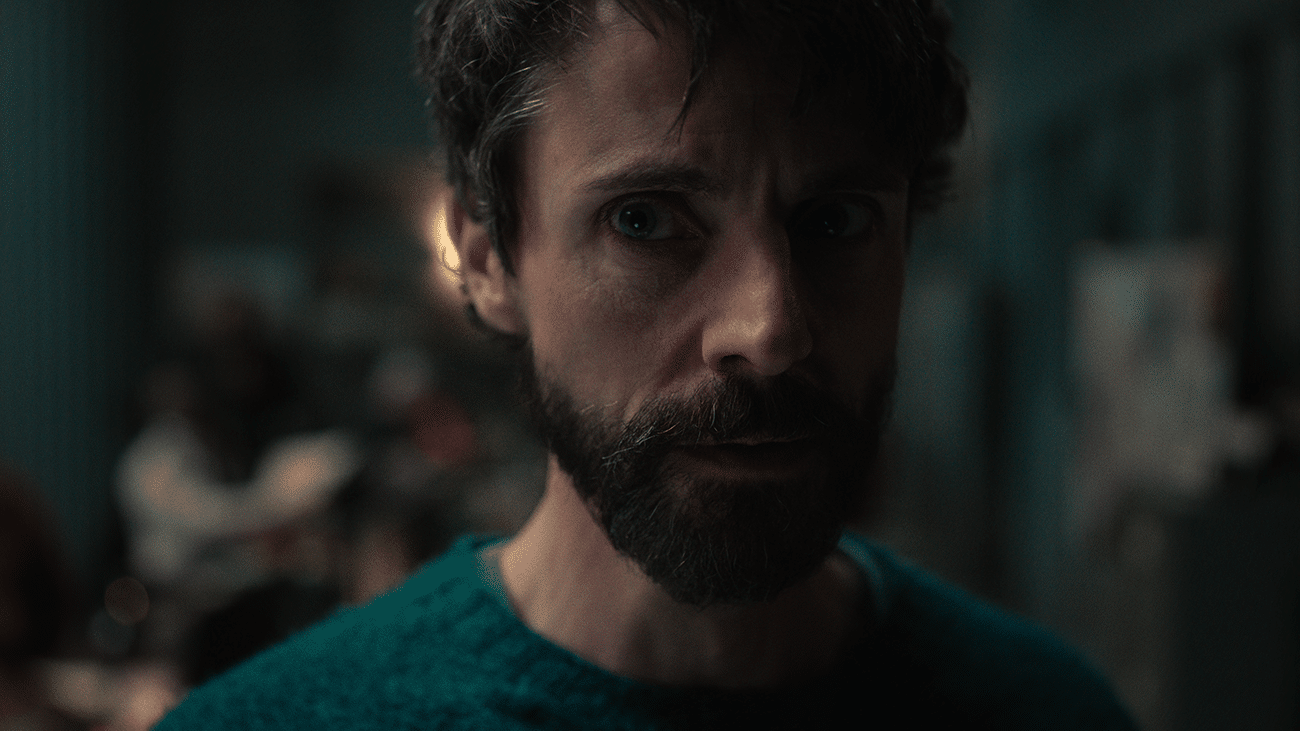

Picture: Matthew Goode as Carl Morck in Dept Q – Netflix
Jacob: The series definitely does give off a Scandinavian vibe. I can see that now, the parallels between some of the Scandinavian crime dramas on Netflix and Dept Q. It’s interesting listening to you talk about the way the music fits the characters and not the location, because with it being set in Scotland, it would have been very easy to dive into traditional Scottish themes. It felt a good choice to go for more of a character-driven score over one to match the location.
Carl: Agreed. I think that’s the sort of job the composer is to score what you don’t see. If the set is there and the actors are speaking in that, with the accent and the costumes, there’s so much work that’s being done that we’re seeing already, and even hearing. Sometimes music doesn’t necessarily need to underscore that, as we’re already seeing it. So let’s talk about what you’re not seeing, what the characters intend, or the mood we’re meant to feel.
There are some uilleann pipes, but they are not specifically Scottish bagpipes. It’s the uilleann pipes that are just used for color, so occasionally you do hear that. There’s a lot of electric guitar in this story, because again, it has to do with the aggression that Scott wanted. But I am a big fan of not necessarily underscoring what you see. I like underscoring what you don’t. And hopefully things that will lead to have a sense of foreboding, like something’s happening, and while I’m not seeing anything happen, maybe something is happening. That’s the goal for me.
Jacob: What is the tone of the music throughout the series? In particular scenes, especially with the press conference, there’s an element of panic, like the character is feeling anxious.
Carlos: Yes, there’s a lot of voice and vocals. We worked with the Budapest Art Orchestra and their choir. His connection to music with Miklos, with whom I collaborated on just about everything I’ve done. Almost every project I’ve worked on, we’ve collaborated with them. This time we had a choir, and there’s a lot of vocals in this story. There’s a repeated “whooo” that occurs throughout, along with the ascending guitars and tension, especially in scenes like the press conference, which leads to a full-blown panic attack when he walks out, and the cars almost hit him on the road.
The music is somewhat odd in its meter, and everything is somewhat reflective. That’s an actual example of underscoring what you see, but you also need to feel it, more than just the visuals. That was a lot of fun to do.
Another scene that I think about, where the score was interesting to try to address, was that there are a lot of scenes that happen in a small chamber, in a small room. And it’s shot and framed with black bars on the sides. Anytime we see that, and it’s not apparent, but if you look for it, it’s there.
When we’re in that chamber where the victim is placed, there are black bars, similar to the two squares we have on our Zoom call right now. The rest of the shot is complete, every other scene, but when we’re in there, those black bars are there. So it’s very constrained. In that constrained space, writing intimate music doesn’t help. I think what helped us as an audience stay connected was the idea of writing music that broke the frames. So if you hear the track out there, it’s called the chamber, you know, in the soundtrack.
It sounds like it’s from outer space. If you listen to it on its own, it has these voices and swirling, so you almost think it’s sci-fi. And the idea was to do something that felt so massive that it would actually break that tightness and claustrophobic sense that we were visually seeing to keep us engaged for the long period of time that we have to deal with being in there throughout the episodes.
Jacob: It’s like with Last Breath, that’s one of the longest pieces of the soundtrack, and I felt that it perfectly encapsulates what you were saying about the sci-fi feel.
Carlos: Yes! Actually, I think that is an amalgamation of all the things we’ve been hearing throughout the nine episodes. They all play out in one way or another, whether it’s something to do with the brother, something to do with the music that you’ll even hear under Carl Morck’s panic attack. All of these things are kind of building up to this moment that leads to the end. But Merrit Lingard in the hyperbaric chamber was one of those things, and the character of Akram has a bit of a theme, he and Rose really, especially when they’re doing their investigative stuff. The end of episode one features a cue called “The Fairy” in the soundtrack. And that really actually is sort of a three-parter.
It’s a montage. And that’s one of the great things I get to do with Scott, is he does a lot of these and has moments where the music is just telling the story along with the visuals. There’s no dialogue, you know. I think the end of episode one is my favorite bit, where you hear when you, as an audience, understand that there are two timelines we’ve been dealing with. Because up until then, you’re good, and you’re like, okay, there’s something important to do with Meritt. Why are we watching her, and why are we? And when you see that moment come together, that was my favorite part to score. Because, well, first of all, the music starts with a very subtle piano version of the main title; Bum, bum, bum, bum. However, you’re hearing it very slowly as we get things started. Then, at some point, Hardy says, ‘Hey, why don’t you just tell me a little bit more about this department?’
Then we hear this other melody, right, that’s sort of the team coming together and doing this. And then, after William hits his sister in the boat, comes the third part, which is when we begin to understand. And we’re hearing what I would refer to as Meritt’s theme, you know, which is this, you listen to it as when we see her walking towards the court at the beginning. We hear that theme, which is this ascending music. And that sort of opportunity to get to do that is something that is, for me, a dream come true. Like that’s the kind of scoring that I live for because you’re super storytelling.
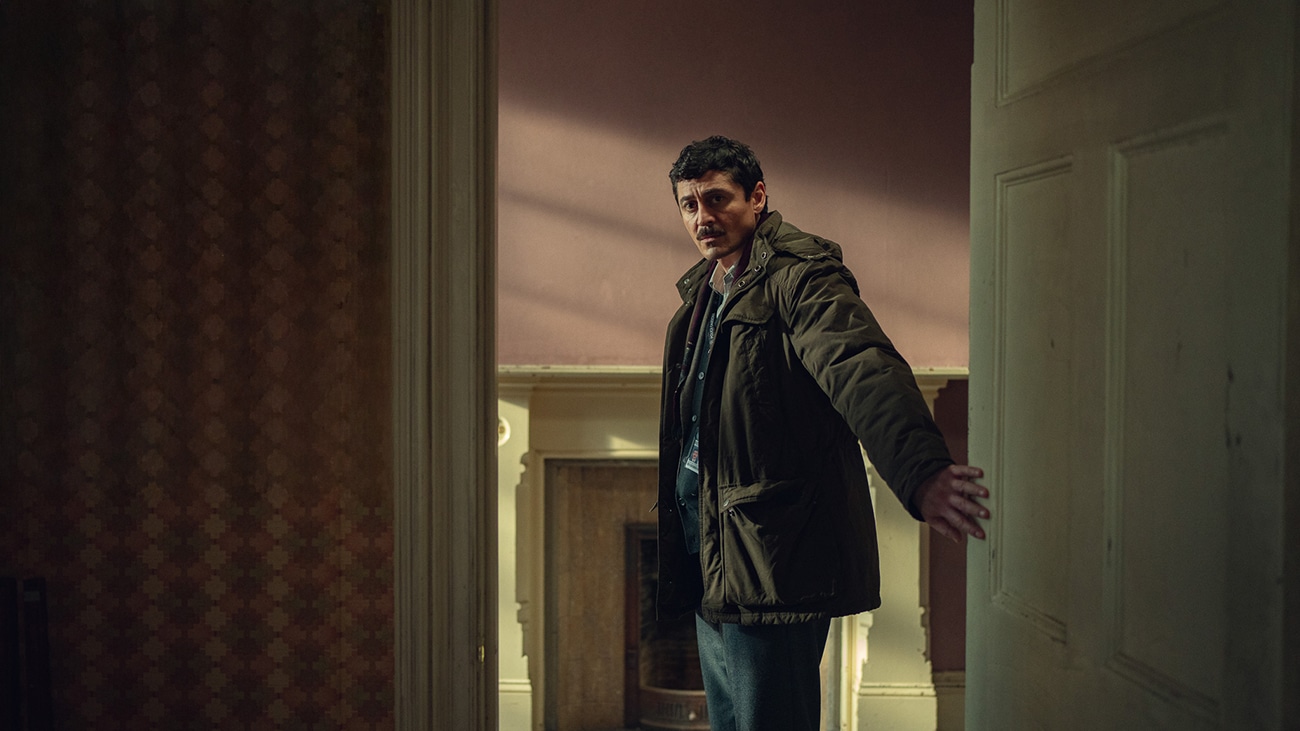

Picture: Alexej Manvelov as Akram Salim in Dept Q – Netflix
As long as Scott approves, I couldn’t be happier. You know, it’s not like I just do it. I do it, and then he has to approve it. However, that back-and-forth collaboration creates a certain quality that I strive for. And I’m proudest, I think, of that bit, how it carries over different themes. And again, sorry to answer your question about Last Breath. It is even more so because now we’re hearing all these other themes that we hadn’t encountered by the end of episode one, leading us into that finale.
Jacob: Was there anything new that you discovered or learned while composing the score?
Carlos: No… I’m just kidding! I think there are a couple of things I think, honestly, getting to do this very aggressive score. Right. So that call, the order, the mandate is that. However, when I saw the office scene, I was sent a much longer version of Carl’s new office scene than what appears in the story we see. It’s maybe two minutes longer, one minute long. But when he goes downstairs for the first time, well, we see Department Q.
But I had a four-minute version. It follows him everywhere, you know, until he turns on the faucet, and it’s leaky, and then he goes and finds the chair, and sits on it. But what you see is, you know, a lot shorter. I wrote music for that.
It was in that moment that I realized that, first of all, it couldn’t be just sound design, which Wylie Stateman would have made a great job of it, because you have all these sounds and you’re here, you’re in the drudgery, you’re underneath the bowels of the building. So there are so many opportunities for sound design to take over, and he did such brilliant work.
If you watch the show, listen for sound design. Just pay attention to what’s happening downstairs. It’s just like you hear pipes cracking and water plumbing. You’re hearing people above in steps and, you know, all these weird, beautiful sounds that make up before dialogue’s happening.
However, I think the challenge for me was to find something that truly represented Carl without being cheesy. And it’s that emotionality that can’t be sappy. And that’s the hardest thing to walk around. You know, here’s something cheesy, sucky, or melodramatic, and you’re like tiptoeing right around it. You have to be on the edge because you have to engage the audience.
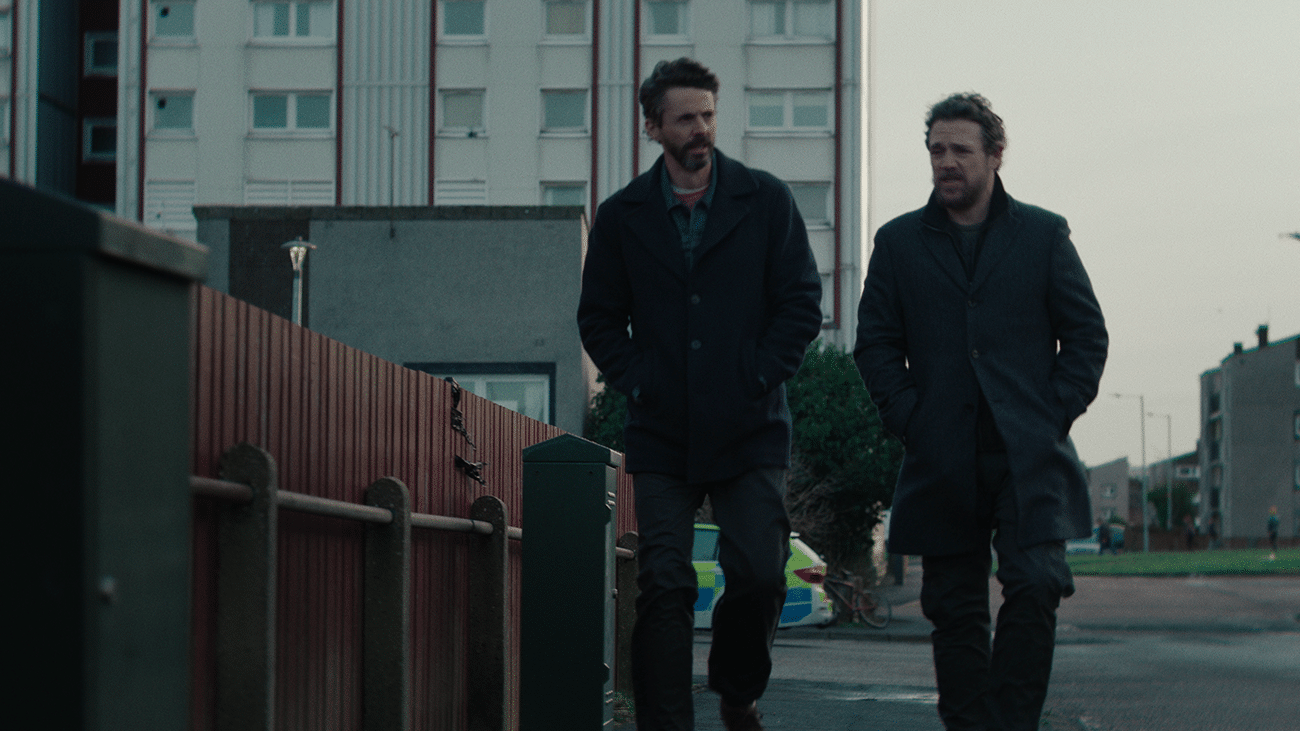

Picture: Matthew Goode as Carl Morck (left) and Jamie Sives as James Hardy (right) – Netflix
So, I wrote a piece that was acoustic guitar-based, which ended up becoming much more representative of Carl’s vulnerable side rather than the aggressive side he presents to the world. That, for me, was being able to find that, and Scott approving being a huge moment because it allowed us to go in different directions with characters that weren’t just aggressive or tone or mood setting, which was a lot of what this story required. It required a lot more mood than melodic work.
Did you enjoy the score of Dept Q? Let us know in the comments below!











